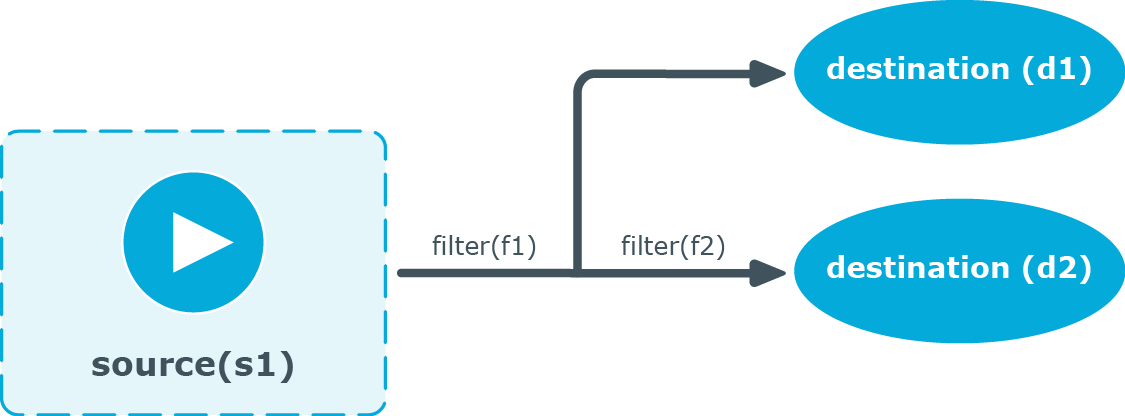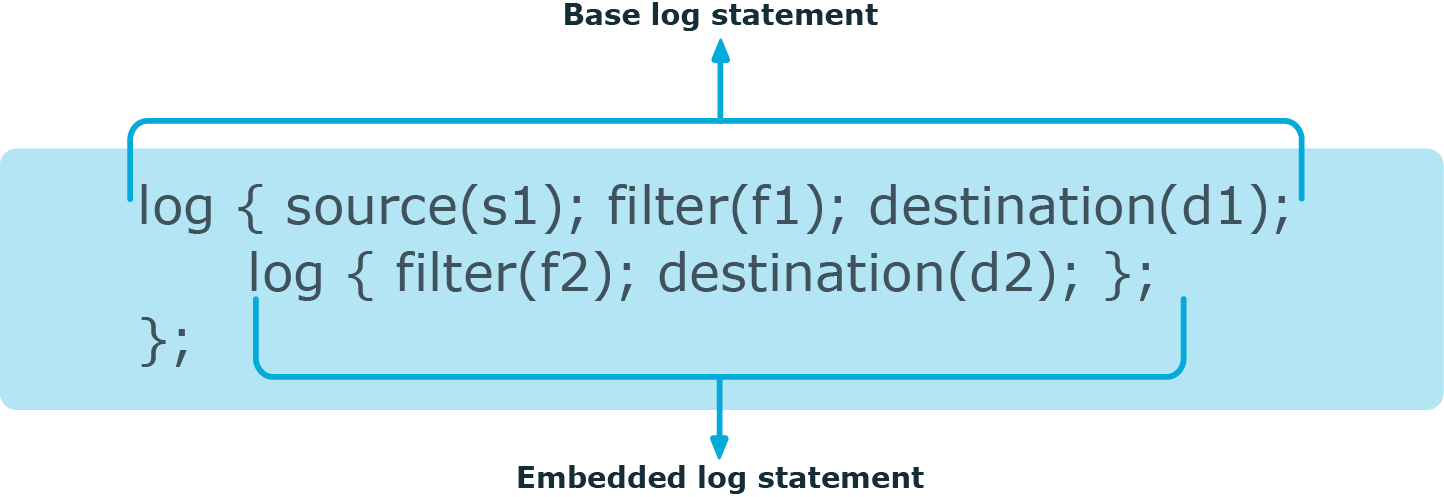Embedded log statements
Starting from version 3.0, syslog-ng can handle embedded log statements (also called log pipes). Embedded log statements are useful for creating complex, multi-level log paths with several destinations and use filters, parsers, and rewrite rules.
For example, if you want to filter your incoming messages based on the facility parameter, and then use further filters to send messages arriving from different hosts to different destinations, you would use embedded log statements.
Figure 12: Embedded log statement

Embedded log statements include sources — and usually filters, parsers, rewrite rules, or destinations — and other log statements that can include filters, parsers, rewrite rules, and destinations. The following rules apply to embedded log statements:
-
Only the beginning (also called top-level) log statement can include sources.
-
Embedded log statements can include multiple log statements on the same level (that is, a top-level log statement can include two or more log statements).
-
Embedded log statements can include several levels of log statements (that is, a top-level log statement can include a log statement that includes another log statement, and so on).
-
After an embedded log statement, you can write either another log statement, or the flags() option of the original log statement. You cannot use filters or other configuration objects. This also means that flags (except for the flow-control flag) apply to the entire log statement, you cannot use them only for the embedded log statement.
-
Embedded log statements that are on the same level receive the same messages from the higher-level log statement. For example, if the top-level log statement includes a filter, the lower-level log statements receive only the messages that pass the filter.
Figure 13: Embedded log statements

Embedded log filters can be used to optimize the processing of log messages, for example, to re-use the results of filtering and rewriting operations.
Using embedded log statements
Embedded log statements (for details, see Embedded log statements) re-use the results of processing messages (for example, the results of filtering or rewriting) to create complex log paths. Embedded log statements use the same syntax as regular log statements, but they cannot contain additional sources. To define embedded log statements, use the following syntax:
log {
source(s1); source(s2); ...
optional_element(filter1|parser1|rewrite1);
optional_element(filter2|parser2|rewrite2);
...
destination(d1); destination(d2); ...
#embedded log statement
log {
optional_element(filter1|parser1|rewrite1);
optional_element(filter2|parser2|rewrite2);
...
destination(d1); destination(d2); ...
#another embedded log statement
log {
optional_element(filter1|parser1|rewrite1);
optional_element(filter2|parser2|rewrite2);
...
destination(d1); destination(d2); ...
};
};
#set flags after the embedded log statements
flags(flag1[, flag2...]);
};
Example: Using embedded log paths
The following log path sends every message to the configured destinations: both the d_file1 and the d_file2 destinations receive every message of the source.
log {
source(s_localhost);
destination(d_file1);
destination(d_file2);
};
The next example is equivalent to the one above, but uses an embedded log statement.
log {
source(s_localhost);
destination(d_file1);
log {
destination(d_file2);
};
};
The following example uses two filters:
-
messages coming from the host 192.168.1.1 are sent to the d_file1 destination, and
-
messages coming from the host 192.168.1.1 and containing the string example are sent to the d_file2 destination.
log {
source(s_localhost);
filter {
host(192.168.1.1);
};
destination(d_file1);
log {
message("example");
destination(d_file2);
};
};
The following example collects logs from multiple source groups and uses the source() filter in the embedded log statement to select messages of the s_network source group.
log {
source(s_localhost);
source(s_network);
destination(d_file1);
log {
filter {
source(s_network);
};
destination(d_file2);
};
};if-else-elif: Conditional expressions
You can use if {}, elif {}, and else {} blocks to configure conditional expressions.
Conditional expressions have two formats:
-
Explicit filter expression:
if (message('foo')) { parser { date-parser(); }; } else { ... };This format only uses the filter expression in if(). If if does not contain 'foo', the else branch is taken.
The else{} branch can be empty, you can use it to send the message to the default branch.
-
Condition embedded in the log path:
if { filter { message('foo')); }; parser { date-parser(); }; } else { ... };This format considers all filters and all parsers as the condition, combined. If the message contains 'foo' and the date-parser() fails, the else branch is taken. Similarly, if the message does not contain 'foo', the else branch is taken.
An alternative, less straightforward way to implement conditional evaluation is to use junctions. For details on junctions and channels, see Junctions and channels.
Junctions and channels
Junctions make it possible to send the messages to different channels, process the messages differently on each channel, and then join every channel together again. You can define any number of channels in a junction: every channel receives a copy of every message that reaches the junction. Every channel can process the messages differently, and at the end of the junction, the processed messages of every channel return to the junction again, where further processing is possible.
A junction includes one or more channels. A channel usually includes at least one filter, though that is not enforced. Otherwise, channels are identical to log statements, and can include any kind of objects, for example, parsers, rewrite rules, destinations, and so on. (For details on using channels, as well as on using channels outside junctions, see Using channels in configuration objects.)
Certain parsers can also act as filters:
-
The JSON parser automatically discards messages that are not valid JSON messages.
-
The csv-parser() discards invalid messages if the flags(drop-invalid) option is set.
You can also use log-path flags in the channels of the junction. Within the junction, a message is processed by every channel, in the order the channels appear in the configuration file. Typically if your channels have filters, you also set the flags(final) option for the channel. However, note that the log-path flags of the channel apply only within the junction, for example, if you set the final flag for a channel, then the subsequent channels of the junction will not receive the message, but this does not affect any other log path or junction of the configuration. The only exception is the flow-control flag: if you enable flow-control in a junction, it affects the entire log path. For details on log-path flags, see Log path flags.
junction {
channel { <other-syslog-ng-objects> <log-path-flags>};
channel { <other-syslog-ng-objects> <log-path-flags>};
...
};
Example: Using junctions
For example, suppose that you have a single network source that receives log messages from different devices, and some devices send messages that are not RFC-compliant (some routers are notorious for that). To solve this problem in earlier versions of syslog-ng OSE, you had to create two different network sources using different IP addresses or ports: one that received the RFC-compliant messages, and one that received the improperly formatted messages (for example, using the flags(no-parse) option). Using junctions this becomes much more simple: you can use a single network source to receive every message, then use a junction and two channels. The first channel processes the RFC-compliant messages, the second everything else. At the end, every message is stored in a single file. The filters used in the example can be host() filters (if you have a list of the IP addresses of the devices sending non-compliant messages), but that depends on your environment.
log {
source {
syslog(
ip(10.1.2.3)
transport("tcp")
flags(no-parse)
);
};
junction {
channel {
filter(f_compliant_hosts);
parser {
syslog-parser();
};
};
channel {
filter(f_noncompliant_hosts);
};
};
destination {
file("/var/log/messages");
};
};
Since every channel receives every message that reaches the junction, use the flags(final) option in the channels to avoid the unnecessary processing the messages multiple times:
log {
source {
syslog(
ip(10.1.2.3)
transport("tcp")
flags(no-parse)
);
};
junction {
channel {
filter(f_compliant_hosts);
parser {
syslog-parser();
};
flags(final);
};
channel {
filter(f_noncompliant_hosts);
flags(final);
};
};
destination {
file("/var/log/messages");
};
};
Note that syslog-ng OSE has several parsers that you can use to parse non-compliant messages. You can even write a custom syslog-ng parser in Python. For details, see parser: Parse and segment structured messages.
Junctions differ from embedded log statements, because embedded log statements are like branches: they split the flow of messages into separate paths, and the different paths do not meet again. Messages processed on different embedded log statements cannot be combined together for further processing. However, junctions split the messages to channels, then combine the channels together.
An alternative, more straightforward way to implement conditional evaluation is to configure conditional expressions using if {}, elif {}, and else {} blocks. For details, see if-else-elif: Conditional expressions.
